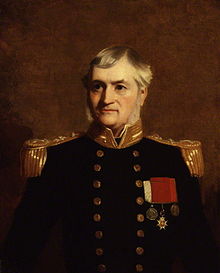Vice Admiral Sir Henry Kellett, KCB (2 November 1806 – 1 March 1875) was an Irish naval officer and explorer.
Sir Henry Kellett | |
|---|---|
 Sir Henry Kellett | |
| Born | 2 November 1806 Tipperary County, Ireland |
| Died | 1 March 1875 (aged 68) Tipperary County, Ireland |
| Allegiance | United Kingdom |
| Service | Royal Navy |
| Years of service | 1822–1871 |
| Rank | Vice admiral |
| Commands | China Station Jamaica Division HMS Resolute HMS Herald HMS Starling |
| Battles / wars | First Opium War |
| Awards | Knight Commander of the Order of the Bath |
Career
editBorn at Clonacody in Tipperary County, Ireland, on 2 November 1806,[1] Kellett joined the Royal Navy in 1822.[2] He spent three years in the West Indies and then served on survey vessels under William Fitzwilliam Owen in Africa, as second-in-command of HMS Sulphur under Edward Belcher in the East Indies,[1] and as captain of HMS Starling in the First Opium War with China during which he was promoted to commander in 1841 and post-captain in 1842.[3]
In 1845 Kellett was appointed captain of the survey ship HMS Herald as part of a hydrography survey mission, the primary objective of which was to survey the coast of the Americas from Guayaquil to Vancouver, including the Galápagos Islands.[4] He was temporarily reassigned in 1848 to join the search for Sir John Franklin. During this voyage he sailed through the Bering Strait across the Chukchi Sea and discovered Herald Island. Kellett landed on Herald Island and named it after his ship. He also sighted Wrangel Island in the western horizon. William Pullen was on this expedition.
In 1852, he commanded HMS Resolute and went to the aid of Robert McClure, whose vessel, Investigator, was trapped in the Arctic.[1] His men constructed a storehouse on Dealy Island off the south coast of Melville Island.[6]
Kellett became Senior Officer in the West Indies in 1855 and superintended Jamaica Dockyard. He served as Admiral Superintendent of the Malta Dockyard in 1864 and Commander-in-Chief, China Station in 1869. Kellett retired in 1871.[2] His final years were spent at Clonacody, where he died on 1 March 1875.[1]
Legacy
editSeveral places in Hong Kong have been named after him: Kellett Island, Kellett Bay and Mount Kellett.[7][8] Kellett Bluff on Henry Island, Washington, USA, was probably named after Captain Kellett as well. It is a place with extreme currents, views, and is frequented by feeding orcas. Kellet's whelk Kelletia kelletii is named after him.[9] On Bank's Island in the Canadian Arctic, Cape Kellett and the Kellett River are named after him.
References
edit- ^ a b c d Neatby, Leslie H. "Kellett, Sir Henry". Dictionary of Canadian Biography. Retrieved 5 July 2019.
- ^ a b "Henry Kellett R.N." pdavis.nl. Retrieved 18 June 2019.
- ^ Barr, William (2007). Arctic Hell-Ship: The Voyage of HMS Enterprise, 1850–1855. Edmonton: University of Alberta Press. p. 7. ISBN 978-0-88864-472-5.
- ^ Quanchi, Max (2005). Historical Dictionary of the Discovery and Exploration of the Pacific Islands. The Scarecrow Press. p. 87. ISBN 0810853957.
- ^ Gerard Donaghy (28 May 2023). "Royal Navy museum buys sledge flag of explorer and 'proud Irishman' Henry Kellett". The Irish Post. Retrieved 9 January 2025.
- ^ Kellets' Storehouse- A Prince of Wales Northern Heritage Centre Online Exhibit Archived 21 November 2008 at the Wayback Machine
- ^ Wordie, Jason (2002). Streets: Exploring Hong Kong Island. Hong Kong: Hong Kong University Press. p. 141. ISBN 962-209-563-1.
- ^ Yanne, Andrew; Heller, Gillis (2009). Signs of a Colonial Era. Hong Kong University Press. p. 41. ISBN 978-962-209-944-9.
- ^ Forbes E. (1850). "On the species of Mollusca collected during the Surveying Voyages of the Herald and Pandora, by Capt. Kellett, R.N., C.B. and Lieut. Wood, R.N.". Proceedings of the Zoological Society of London 18: 270-274. plate IX, figure 10.
Further reading
edit- O'Byrne, William R. (1849). . A Naval Biographical Dictionary. Vol. 12.2. London: John Murray. p. 601.
- Murphy, David (October 2004). The Arctic Fox: Francis Leopold-McClintock, Discoverer of the Fate of Franklin. Dundurn Press. ISBN 978-1-77070-179-3.